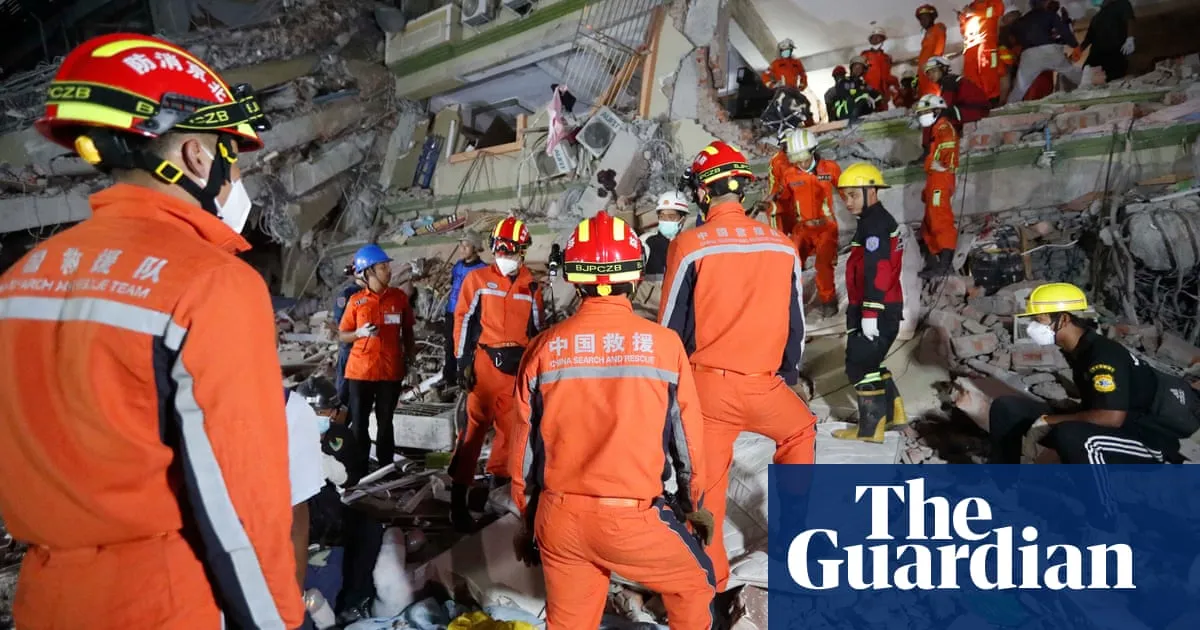
As aid from China, Russia, India, and the UK begins to arrive in Myanmar, a notable absence is felt from the world's wealthiest nation, the United States. The recent catastrophic earthquake, which registered a powerful 7.7-magnitude, struck central Myanmar on Friday, resulting in extensive destruction, particularly in the country’s second-largest city, Mandalay. The tremors were even felt as far away as Bangkok, Thailand, over 600 miles (1,000 km) from the epicenter. The full extent of the disaster remains unclear, as access to the affected regions is limited due to ongoing conflicts that have plagued Myanmar since the military coup in 2021. With the current death toll standing at 1,700, it is widely anticipated that this number will continue to rise.
In the face of logistical challenges, several nations have responded swiftly to the humanitarian crisis. Critics have pointed fingers at former President Donald Trump for undermining the US's ability to react to international disasters, particularly through significant cuts to foreign aid programs. In stark contrast, China dispatched an 82-member rescue team to Myanmar on Saturday, followed by a 118-member search and rescue team reported by the state-run Xinhua news agency on Sunday. This team comprised earthquake experts, medical personnel, field hospital staff, and rescue dogs.
On Monday, the Chinese government announced that it had sent a first batch of relief supplies, valued at 100 million yuan (approximately $13.78 million), to Myanmar. These supplies included essential items such as tents, blankets, and first aid kits. In addition, Hong Kong has allocated HK$30 million (around $3.8 million) for emergency relief and dispatched a 51-member team equipped with two search and rescue dogs and advanced life detection equipment.
Russia's emergency and health ministries have also mobilized, sending a contingent of 120 rescuers along with medical supplies to Myanmar. Meanwhile, an aid flight from India successfully landed in Myanmar on Saturday, with additional support from four more aircraft and two navy ships en route. The UK government has pledged £10 million ($12.9 million) in humanitarian aid, with local partners already mobilizing on the ground to assist those affected. The European Union has committed €2.5 million ($2.7 million) in initial emergency relief.
From Southeast Asia, Indonesia is set to provide logistical support starting Monday, which includes a hospital ship and several helicopters. Additionally, the Philippines and Vietnam are dispatching medical teams to assist in the rescue and recovery efforts. In stark contrast to the swift actions of these nations, the US has been slow to respond, only announcing a modest pledge of $2 million on Sunday.
In a statement, Donald Trump characterized the earthquake as “terrible” and expressed the US's intent to assist, noting that discussions had already taken place with Myanmar. The US embassy in Myanmar indicated that a USAID emergency response team would be deployed to assess the most critical needs, including emergency shelter, food, medical supplies, and access to clean water. However, due to Trump's cuts to foreign aid infrastructure, the three-person USAID assessment team is not expected to arrive until Wednesday, nearly a week after the disaster.
Concerns have been raised regarding the effectiveness of the US's aid response, especially given the dismantling of systems required for effective aid distribution. Phil Robertson, director of Asia Human Rights and Labour Advocates, pointed out that the US has transitioned from a global leader in disaster response to a laggard. The absence of USAID's elite disaster assistance response teams (DARTs), typically deployed for such emergencies, further complicates the situation. Robertson emphasized that the US's capacity for soft power has been significantly diminished.
Humanitarian organizations, including Doctors Without Borders, stress the importance of rapid aid deployment following natural disasters. The World Health Organization, which the US recently withdrew from, has mobilized its logistics hub in Dubai to prepare trauma supplies and initiate its emergency response. The organization is urgently seeking $8 million to support life-saving efforts and prevent disease outbreaks in the wake of the earthquake.
Additionally, the UN humanitarian agency, OCHA, is organizing emergency response efforts in collaboration with its partners. OCHA reported a critical shortage of medical supplies necessary for effective response, which includes trauma kits, blood bags, anesthetics, assistive devices, essential medications, and tents for health workers. The situation in Myanmar remains dire, with the need for a coordinated and rapid response becoming increasingly urgent as the humanitarian crisis unfolds.